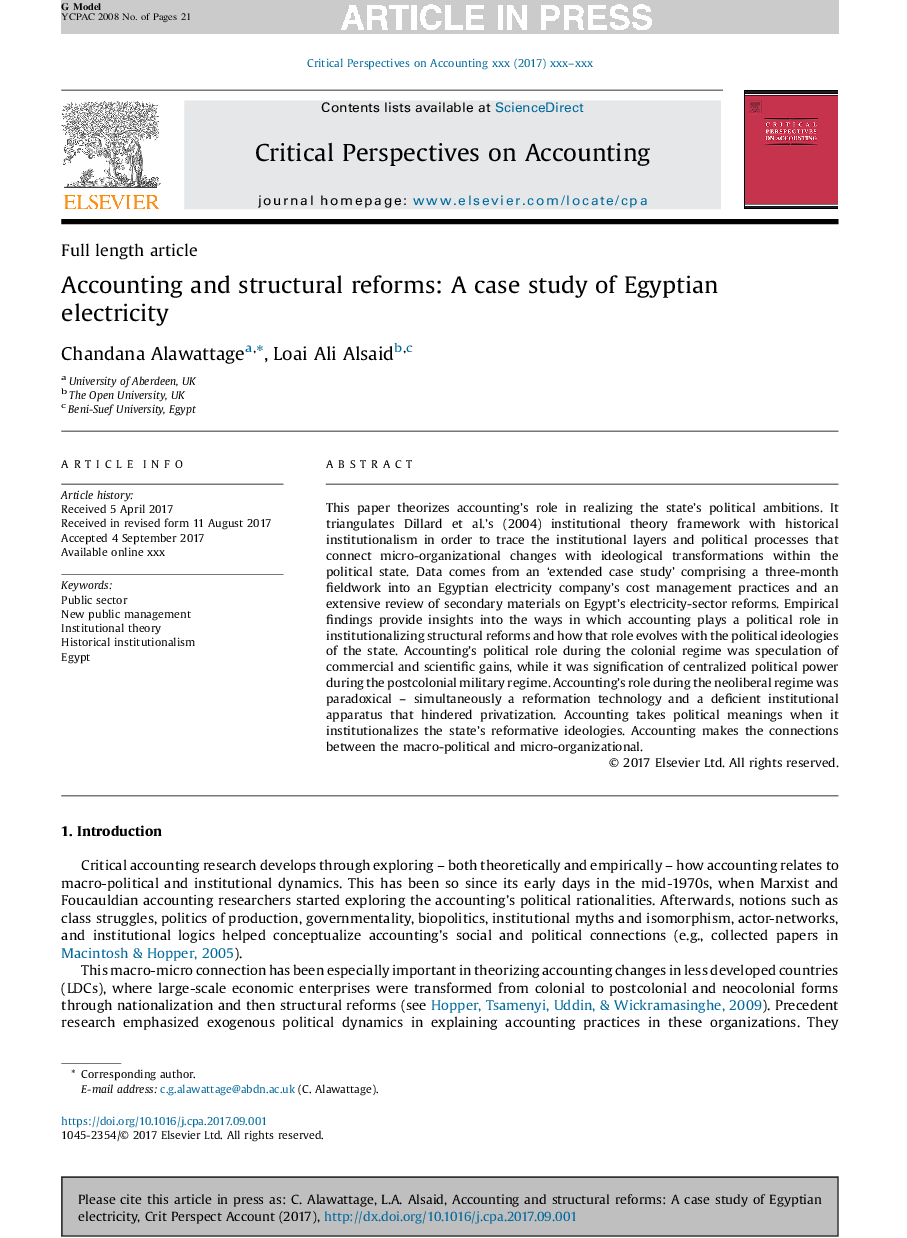| کد مقاله | کد نشریه | سال انتشار | مقاله انگلیسی | نسخه تمام متن |
|---|---|---|---|---|
| 7412082 | 1481685 | 2018 | 21 صفحه PDF | دانلود رایگان |
عنوان انگلیسی مقاله ISI
Accounting and structural reforms: A case study of Egyptian electricity
ترجمه فارسی عنوان
حسابداری و اصلاحات ساختاری: مطالعه موردی برق مصر
دانلود مقاله + سفارش ترجمه
دانلود مقاله ISI انگلیسی
رایگان برای ایرانیان
کلمات کلیدی
بخش عمومی، مدیریت عمومی جدید، تئوری نهادی، نهادگرایی تاریخی، مصر،
ترجمه چکیده
این مقاله نقش حسابداری را در تحقق اهداف سیاسی دولت بررسی می کند. این تئوری چارچوب تئوری نهادینه سازی دیلارد و دیگران (2004) را با نوگرایی تاریخی تثبیت می کند تا لایه های سازمانی و فرآیندهای سیاسی را که تغییرات سازمانی میکرو سازمانی را با تحولات ایدئولوژیک درون دولت سیاسی مرتبط می کند، ردیابی کند. داده ها از "مطالعه موردی پیشرفته" شامل سه ماه تحقیق در زمینه فعالیت های مدیریت هزینه برق شرکت مصری و بازبینی گسترده مواد ثانویه در اصلاحات بخش برق مصر است. یافته های تجربی ارائه می دهد بینش هایی را در مورد روش هایی که حسابداری نقش سیاسی در نهادینه سازی اصلاحات ساختاری و چگونگی نقش آن با ایدئولوژی های سیاسی دولت ایفا می کند، ارائه می دهد. نقش سیاسی حسابداری در دوران رژیم استعماری، پیش بینی سود تجاری و علمی بود، در حالیکه این نشان دهنده قدرت سیاسی متمرکز در دوران رژیم نظامی پسااستعماری بود. نقش حسابداری در دوران رژیم نئولیبرالی متناقض بود - همزمان یک تکنولوژی اصلاح و یک دستگاه نهادی ضعیف که مانع خصوصی سازی شد. حسابداری وقتی معنایات سیاسی را به عنوان نهادینه سازی ایدئولوژی های اصلاحی دولتی می گیرد معنای سیاسی می گیرد. حسابداری باعث ایجاد ارتباط بین کلان سیاسی و سازمانی می شود.
موضوعات مرتبط
علوم انسانی و اجتماعی
مدیریت، کسب و کار و حسابداری
حسابداری
چکیده انگلیسی
This paper theorizes accounting's role in realizing the state's political ambitions. It triangulates Dillard et al.'s (2004) institutional theory framework with historical institutionalism in order to trace the institutional layers and political processes that connect micro-organizational changes with ideological transformations within the political state. Data comes from an 'extended case study' comprising a three-month fieldwork into an Egyptian electricity company's cost management practices and an extensive review of secondary materials on Egypt's electricity-sector reforms. Empirical findings provide insights into the ways in which accounting plays a political role in institutionalizing structural reforms and how that role evolves with the political ideologies of the state. Accounting's political role during the colonial regime was speculation of commercial and scientific gains, while it was signification of centralized political power during the postcolonial military regime. Accounting's role during the neoliberal regime was paradoxical - simultaneously a reformation technology and a deficient institutional apparatus that hindered privatization. Accounting takes political meanings when it institutionalizes the state's reformative ideologies. Accounting makes the connections between the macro-political and micro-organizational.
ناشر
Database: Elsevier - ScienceDirect (ساینس دایرکت)
Journal: Critical Perspectives on Accounting - Volume 50, January 2018, Pages 15-35
Journal: Critical Perspectives on Accounting - Volume 50, January 2018, Pages 15-35
نویسندگان
Chandana Alawattage, Loai Ali Alsaid,
